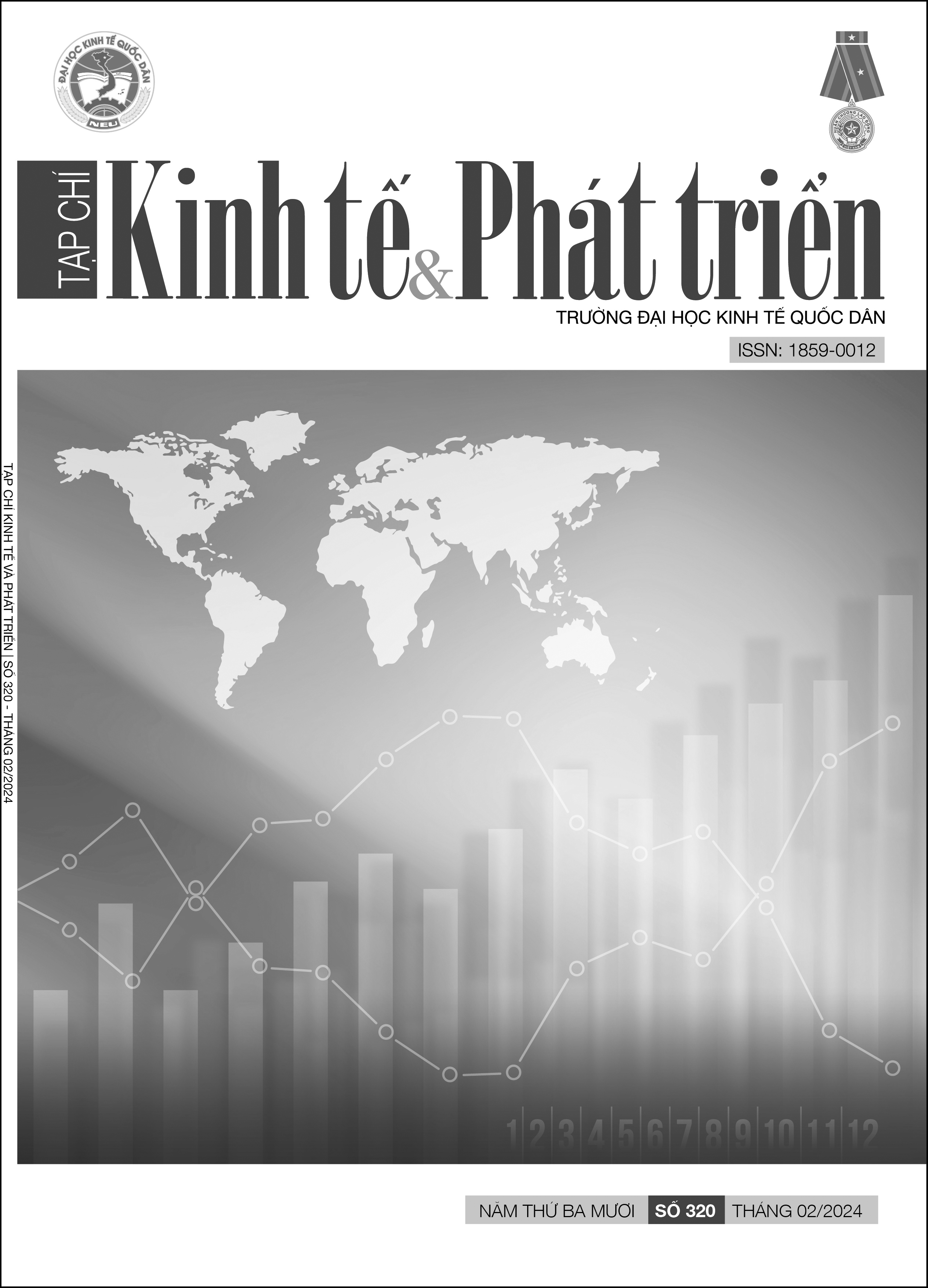Xây dựng thang đo tổ chức học tập trong các doanh nghiệp Việt Nam
DOI:
https://doi.org/10.33301/JED.VI.1501Từ khóa:
Tổ chức học tập, lý thuyết nguồn lực, thang đo tổ chức học tậpTóm tắt
Môi trường kinh doanh có sự thay đổi nhanh chóng, tổ chức cần xây dựng tổ chức học tập là một trong những cách thức giúp tổ xây dựng lợi thế cạnh tranh của tổ chức. Trong nghiên cứu này, tác giả xây dựng thang đo với tổ chức học tập để xác định các thành phần trong tổ chức học tập trong các doanh nghiệp Việt Nam để có thể xây dựng và duy trì lợi thế cạnh tranh thông qua nguồn lực tri thức trong tổ chức. Phương pháp nghiên cứu định lượng và định tính được thực hiện đã xác định các thành phần của tổ chức học tập ở các doanh nghiệp Việt Nam. Kết quả nghiên cứu làm căn cứ để các tổ chức xây dựng và hoàn thiện tổ chức học tập trong bối cảnh doanh nghiệp ngày càng phải đối mặt với nhiều thách thức từ môi trường kinh doanh.
Tài liệu tham khảo
Alerasoul, S.A., Afeltra, G., Hakala, H., Minelli, E. & Strozzi, F. (2022), ‘Organisational learning, learning organisation, and learning orientation: An integrative review and framework’, Human Resource Management Review, 32(3), DOI:10.1016/J.HRMR.2021.100854.
Armstrong, A. & Foley, P. (2003), ‘Foundations for a learning organization: organization learning mechanisms’, The learning organization, 10(2), 74-82.
Bui, Q.T. (2021), ‘Building a learning organization in the digital era: A proposed model for Vietnamese enterprises’, International Review of Management and Marketing, 11(3), 42-48.
Delić, M., Slåtten, T., Milić, B., Marjanović, U. & Vulanović, S. (2017), ‘Fostering learning organisation in transitional economy–the role of authentic leadership and employee affective commitment’, International Journal of Quality and Service Sciences, 9(3/4), 441-455.
Dowd, J.F. (1999), ‘Learning organizations: an introduction’, Managed care quarterly, 7(2), 43-50.
Garvin, D.A. (1993), ‘Building a learning organization’, Harvard Business Review, 71(4), 78-91.
Garvin, D.A., Edmondson, A.C. & Gino, F. (2008), ‘Is yours a learning organization?’, Harvard business review, 86(3), 1-10.
Hair Jr., J.F., Black, W.C., Babin, B.J. & Anderson, R.E. (2010), Multivariate Data Analysis: A Global Perspective, 7th Edition, Pearson Education, Upper Saddle River.
Kim, J., Egan, T. & Tolson, H. (2015), ‘Examining the dimensions of the learning organization questionnaire: A review and critique of research utilizing the DLOQ’, Human Resource Development Review, 14, 91-112.
Kim, K., Watkins, K.E. & Lu, Z. (2017), ‘The impact of a learning organization on performance: Focusing on knowledge performance and financial performance’, European Journal of Training and Development, 41, 177-193.
Kumar, M., Paul, J., Misra, M. & Romanello, R. (2021), ‘The creation and development of learning organizations: A review’, Journal of knowledge management, 25(10), 2540-2566.
Lewis, D. (2002), ‘Five years on–the organizational culture saga revisited’, Leadership & Organization Development Journal, 23(5), 280-287.
Liao, S.H., Chang, W.J. & Wu, C.C. (2010), ‘An integrated model for learning organization with strategic view: Benchmarking in the knowledge-intensive industry’, Expert Systems with applications, 37(5), 3792-3798.
Malik, P. & Garg, P. (2020), ‘Learning organization and work engagement: The mediating role of employee resilience’, The International Journal of Human Resource Management, 31(8), 1071-1094.
Nhung, N.T., Dong, P.T. & Dũng, T.T. (2023), ‘Tổ chức học tập và học tập của tổ chức’, Tạp chí Khoa học Trường Đại học Mở Hà Nội, 1-8.
Phạm Thị Liên & Bùi Quang Tuyến (2017), ‘Tác động của nhân tố học tập của tổ chức tới kết quả kinh doanh: nghiên cứu tại tập đoàn Viettel’, Tạp chí Kinh tế & Phát triển, 235(II), 96-104.
Pokharel, M.P. & Choi, S.O. (2015), ‘Exploring the relationships between the learning organization and organizational performance’, Management Research Review, 38, 126-148.
Shin, H.W., Picken, J.C. & Dess, G.G. (2017), ‘Revisiting the learning organization: How to create it’, Organizational Dynamics, 46(1), 46-56.
Singer, S.J., Moore, S.C., Meterko, M. & Williams, S. (2012), ‘Development of a short-form learning organization survey: The LOS-27’, Medical Care Research and Review, 69(4), 432-459.
Smith, K.A., Vasudevan, S.P. & Tanniru, M.R. (1996), ‘Organizational learning and resource‐based theory: An integrative model’, Journal of Organizational Change Management, 9(6), 41-53.
Song, J.H., Joo, B.K. & Chermack, T.J. (2009), ‘The dimensions of learning organization questionnaire (DLOQ): A validation study in a Korean context’, Human Resource Development Quarterly, 20(1), 43-64.
Thanh, P.T.N.V., Ánh, T.N.T. & Hòa, T.L.V. (2013), ‘Tổ chức học tập trong doanh nghiệp Việt Nam: Thực trạng và giải pháp’, Tạp chí Kinh tế & Phát triển, 191(II).
Yaghmaie, F.J.A.M. (2003), ‘Content validity and its estimation’, Journal of medical education, 3(1), 25-27.
Yang, B., Watkins, K.E. & Marsick, V.J. (2004), ‘The construct of the learning organization: Dimensions, measurement, and validation’, Human resource development quarterly, 15(1), 31-55.
Watkins, K.E. & Dirani, K.M. (2013), ‘A meta-analysis of the dimensions of a learning organization questionnaire looking across cultures, ranks, and industries’, Advances in Developing Human Resources, 15, 148-162.
Watkins, K.E. & Kim, K. (2018), ‘Current status and promising directions for research on the learning organization’, Human Resource Development Quarterly, 29(1), 15-29.
Watkins, K.E. & Marsick, V.J. (1993), Sculpting the learning organization: Lessons in the art and science of systemic change, San Francisco, CA: Jossey-Bass.





